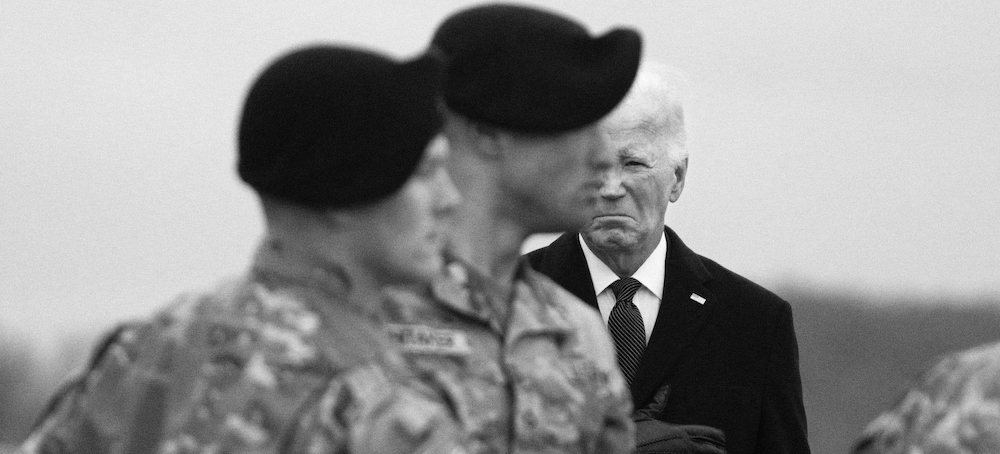The US Tries Escalating to Deescalate
David A. Graham The Atlantic "The White House felt a need to respond to a drone attack this week in Jordan that killed three U.S. service members." (photo: Roberto Schmidt/AFP)
"The White House felt a need to respond to a drone attack this week in Jordan that killed three U.S. service members." (photo: Roberto Schmidt/AFP)
A series of attacks on Iranian-backed militias in Syria and Iraq appeared aimed at reestablishing deterrence without sparking a wider conflict.
But in a policy paradox, the move appears to be an attempt to deescalate by means of powerful air strikes. The White House felt a need to respond to a drone attack this week in Jordan that killed three U.S. service members, and which the U.S. has blamed on Kataib Hezbollah, an Iranian-backed militia in Iraq. Yet it has avoided striking Iran on its own soil, and it hinted at the strikes for days before making them, giving ample time for potential targets to be evacuated. In this way, strikes that might seem like an escalation are actually President Joe Biden’s attempt to reestablish deterrence and stay the course of his current regional strategy.
The U.S. government said its attacks targeted not only militias backed by Iran, but also the Quds Force of Iran’s Islamic Revolutionary Guards Corps, a powerful regional merchant of mischief. Iran said that an officer in the IRGC was killed in one of the strikes, in Syria. The strikes, which are expected to continue for several days, represent a more robust response than the U.S. has offered to other recent Iranian provocations, including in the direct targeting of the Quds Force. A statement from Central Command said that more than 85 targets were struck, with an emphasis on the supply and logistics chains that have enabled ongoing attacks.
Since Hamas’s massacres on October 7, fears of a regional war in the Middle East—or even a third World War—have risen. (Hamas is an Iranian client, though American intelligence reportedly suggests the timing and scope of the attack were a surprise to Iran’s leaders.) Even as Israel continues its offensive in Gaza, new tensions have risen with Hezbollah, yet another Iranian proxy that sits on Israel’s northern border, with Lebanon. And in the Red Sea, the Tehran-backed Houthis have launched attacks on shipping from Yemen.
Practically no one wants such a regional war: Not the Israelis, not the American government or other Western allies, not Arab governments, and probably not Iran, either. But Iran wants to get in as many shots at Israel and the U.S. as it can without an outright war, and it feels pressured to live up to the image it has cultivated as Israel’s nemesis.
In Washington, two distinct camps have emerged. One wishes to avoid a proxy war turning into the genuine article, with the U.S. striking within the Islamic Republic, which this camp believes would be bad for American interests in the region and would only uplift Iran. The other believes, as my colleague Eliot Cohen laid out this week, that failing to respond forcefully to Iran’s provocations is encouraging more bad actions like those of the Houthis and Kataib Hezbollah. Both sides believe that their approach gives the U.S. the best chance to stave off regional war, but armed conflict doesn’t give any chance for A/B testing.
Biden said on Tuesday that he’d made his decision about action, but the payoff didn’t come until today. With his deliberate—or to hawks, dilatory—response to the attack in Jordan, the president has affirmed that his administration doesn’t want to be drawn into a more direct confrontation with Iran, and hopes to keep regional tensions at a simmer, rather than boiling over.



